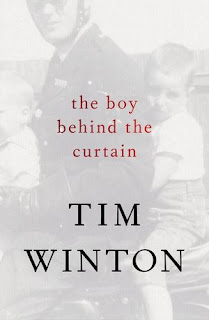Slice of Life Story- Wise Words of Winton
Enjoyed the privilege of hearing iconic Australian author, Tim Winton talk about his writing life on Friday. He also discussed the writing of his latest memoir instalment, ‘The Boy Behind The Mirror,’ chronicling aspects of his earlier life in Western Australian and the influences on his writing life.
My library
has many of Winton’s books from the iconic fictional saga of ‘Cloudstreet’ to ‘Dirt
Music’ and 'Blueback' to one of my personal favourites, ‘Land’s Edge,’ a coastal memoir, in
which the author writes about his obsession with what occurs where the water
meets the shoreline. It is a homage to the ocean and his childhood and the
thread that links the two. It is for me, a book to which I regularly return, to experience the joy of discovering literary treasures.
I hold two copies of this book in my library. The
first copy came complete with a catalogue of colour photographs. It was reminiscent
of a coffee table book. It was later republished in a trimmed back version paying
all due attention to the memoir. There was no ambiguity the second time. It was
this version I wanted signed, for it is this book, I frequently pull from the
shelves. The words wash over me; swirl around me, each time I open it. He
smiled as he graciously signed my much loved, time worn copy.
During his
presentation, Tim recounted stories and reflected on life, informing and
entertaining his audience over the course of an hour. His most telling comment
related to the very act of writing:
‘Anyone who has been a
child has enough to write about for the rest of their lives.’
This reminded
me of something another Australian author, Paul Jennings once said. ‘There are
a million stories inside each of us just waiting to be told.’
Tim was
asked, from where did the inspiration for writing emerge and his response
underscored the importance of being a reader.
‘I started writing
because I loved reading. I wanted to be in it.’
It underscored
the critical importance of ensuring young learners are supported in developing
a love of reading. As writers, they need to understand the infinite power
reading possesses to influence the writing they produce. You cannot hope to be
successful in your attempts at writing unless you allow reading into your life.
It generates the fuel which energises writing. It influences word choice and
delivery. I am reminded again by a famous quote attributed to Walt Disney, ‘There
is more treasure in books than in all the pirate's loot on Treasure Island.’
‘I find it hard to read as a civilian. I tend
to read as a writer.’
When Tim
mentioned how he read, I nearly leapt from my seat shouting, Hooray! How
wonderful it was to hear these words. Those who write read words differently.
They celebrate the craft of writing, they hear the unique magic of certain
combinations of words. They allow themselves to be informed by the writing of
others. When you read like a writer it allows one to delve below the surface of
page. It is a passport to deeper understanding of how the text has been
constructed and why the writer has made certain choices.
When asked
the perennial question about where his ideas come from, the answer was quite
revealing.
‘I start from a place,
a background, a landscape and this create the characters.’
This
comment reminded me of the line in the movie, Field of Dreams- ‘If you build it, they will
come.’
In this instance Tim Winton creates a setting in which certain
characters can operate, live out their lives, perform actions. The writer is
challenged to create an emotional response within a landscape.
Writers
share. They willingly share unique aspects and learned truths about their
writing lives. I hung on every word. I was as ever, a curious learner in the
presence of a master story teller. I soaked up those affirming words of wisdom from
Winton.










Starting from the landscape of childhood (mixing up the quotes here on purpose) is a rich vein of writing experience. I love hearing writers talk or write about their process. There are always ways in which we are similar and very different. All ways make sense to the writer.
ReplyDeleteKevin
I found that first observation so powerful and true - it's what I hope to tap into with the children in my classroom.
ReplyDeleteWhat an evening to savor! His words simply reaffirm the importance of allowing children to write.
ReplyDeleteI love hearing what writers have to say. I, too, sometimes find it hard to read as a civilain. I read like a teacher.
ReplyDeleteProcess is the reason I write. I love learning about your process. Thank you for sharing.
ReplyDeleteDo you read as a teacher who writes perhaps?
ReplyDeleteThank you Kimberley. Each of us has a unique process and that is what makes writing so fascinating.
ReplyDeleteIt was indeed an occasion to savour. Choice is critical for our young writers as it is for all writers.
ReplyDeleteI have no doubt you tap into this in your classroom Tara. No doubt whatsoever.
ReplyDeleteThis sharing of process is so instructive and affirming Kevin. Similarities and difference add to the richness of this writing life we pursue.
ReplyDelete